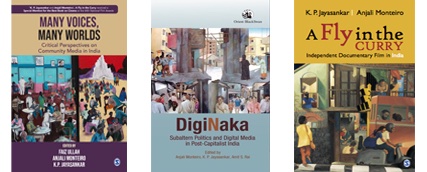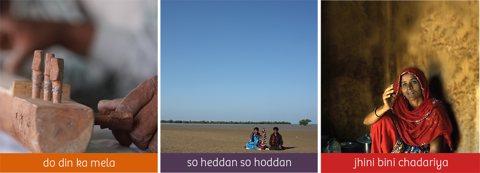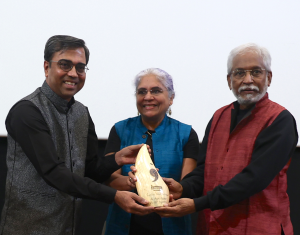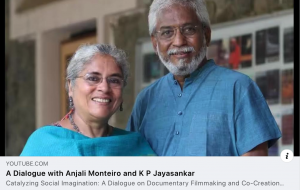From Do Din Ka Mela, 2009
Publications

A Fly in the Curry: Independent Documentary in India: New Edition
K.P. Jayasankar and Anjali Monteiro, 2024, Aakar (Paperback). Sage 2016 (Hard Cover)
Many Voices, Many Worlds: Critical Perspectives on Community Media in India
Faiz Ullah, Anjali Monteiro and K.P. Jayasankar (Eds.), 2021, Sage
DigiNaka: Subaltern Politics and Digital Media in Post-Capitalist India
Anjali Monteiro, K.P. Jayasankar, Amit S. Rai (Eds.) 2020, Orient Black Swan
Films

The Kachchh Trilogy
Kachchh is a ‘border’ district of Gujarat, which has historically had a close relationship with Sindh, now in Pakistan. Prior to the Partition of India and Pakistan in 1947, the communities in this region, mostly pastoralists, moved freely across the Great Rann of Kachchh, between Kachchh and Sindh, in search of water and pastures. Until the Indo-Pakistan war of 1965, the border between Kachchh and Sindh was a porous one, with frequent movement for trade and grazing. Sindh and Kachchh share common cultural traditions, drawing on Sufism and other traditions, as well as the same repertoire of poetry, folklore, embroidery, architectural practices and visual cultures.
The cultures of this arid region bear witness to this long history of migration and movement, and memories of translocation, partition and natural calamities). The cultural repertoire that the Jatts, the Meghwals and other communities draw upon includes the qafi or classical poetry of Sindh, much of it the work of Shah Abdul Latif Bhitai (1689-1752) a Sufi poet, whose work has been passed down the generations through oral traditions, as also the verses of Kabir, a 15th century mystic weaver-poet. They form a rich tapestry of many traditions and faiths, an affirmation of the syncretic wisdom of the marginalised communities that live in this visually spectacular area.
The Trilogy of films is the outcome of the documentation of the musical and poetic traditions of pastoral communities, since 2008.
Announcements

National Institute of Design (NID), Ahmedabad confers the Prof. Satish Bahadur Lifetime Achievement Award for Outstanding Contribution to Film Education on Anjali Monteiro and KP Jayasankar, at the 6th Alpavirama — International Youth Film Festival, November 2022. Alpavirama also hosted an exhibition entitled Sutradhar, based on their work. Read More

Catalyzing Social Imagination
A Dialogue on Documentary Filmmaking and Co-Creation

Anjali Monteiro and KP Jayasankar in conversation with Uday Dandavate, who is creating an archive of conversations entitled ‘The Legacy of India’s Imagination’ as a part of the birth centenary celebrations of his father the late socialist leader Prof. Madhu Dandavate.
